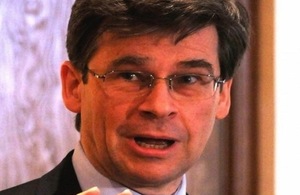"Russia has suffered strategic derailment through its adventure in Ukraine"
Writing in the Wall Street Journal, UK Ambassador to NATO, Sir Adam Thomson, argued that the West would not forget Crimea, one year on.

Sir Adam Thomson
The West Remembers Crimea
Wall Street Journal - Friday 20 March
A year ago, Moscow staged an illegal and illegitimate “referendum” in Crimea that quickly culminated in Russia’s annexation of Crimea from Ukraine. Anybody who cares about truth, peace, human lives and the freedom of European states to determine their future without coercion should remember this anniversary every year. Russia redrew the map of Europe by force, lied about what it was doing and deepened the crisis in eastern Ukraine.
The annexation was conducted under the pretext that the rights of Russian-speakers in Crimea were under threat from Kiev. But there was no such threat. Shortly before the annexation, the Organization for Security and Co-operation in Europe’s high commissioner for national minorities reported that there was “no evidence of any violence or threats.” Instead, reports by the OSCE high commissioner, the Council of Europe’s commissioner for human rights and the United Nations have all shown that it was only after Russian occupation that human rights came under threat in Crimea. The effects have been especially felt by Crimea’s ethnic minorities, such as the sizeable Crimean Tatar community.
The “referendum” was hastily prepared in the span of two weeks. It did not meet democratic norms. There were no independent, international monitors. Elite Russian troops—the “little green men,” as locals labeled them—appeared on the ground to shape and influence the result of the vote. Their equipment, accents and training all showed them to be Russian.
In March 2014 Vladimir Putin said that there were no Russian troops present and that he was not considering the possibility of Crimea joining Russia. Last week, Mr. Putin admitted in an interview that he started planning the annexation of Crimea on Feb. 22, 2014, weeks before the “referendum” took place.
The whole, brisk process took only a matter of weeks. And, perhaps emboldened by this success in annexing territory in Ukraine’s south, Moscow moved on to the destabilization of eastern Ukraine with a steady flow of weaponry and soldiers, with the disastrous consequences we have all seen.
It is vital that the significance of Crimea’s annexation not be played down. Russia’s actions there and in the Donbas region of eastern Ukraine are not only a threat to Ukraine but also to the rest of Europe.
By annexing Crimea, violating its territorial integrity and destabilizing eastern Ukraine, Russia has intensified its challenge to Europe’s painstakingly constructed security architecture and has ripped up the international rulebook. Russia is violating its own international commitments, including under the U.N. Charter, the OSCE Helsinki Final Act, the 2008 Budapest Memorandum and the 1997 Partition Treaty on the Status and Conditions of the Black Sea Fleet with Ukraine.
Commitments matter. Truth matters. Lies destabilize. If Mr. Putin tells Russia’s neighbors today that they will not be next after Crimea and eastern Ukraine, should they believe him?
That is why remembering this anniversary matters. We must not accept Russia’s illegal annexation of Crimea as a new reality and still less as a new normal. It is important that Russia has found itself isolated in the Security Council and in the wider international community. All Europeans, all North Atlantic Treaty Organization members and European Union nations should stand up for their shared values and their common security.
Russia, tragically, has suffered strategic derailment through its adventure in Ukraine. But that does not make its behavior safe. There is a way out. Russia can still withdraw its troops from Crimea and eastern Ukraine, abide by its commitments under the Minsk agreements and let the Ukrainian people run their own country.
But until this happens, our established position is firm: Crimea’s annexation is unacceptable, and we will continue to defend our values with sanctions that punish those responsible.
Sir Adam Thomson is Britain’s permanent representative to NATO.